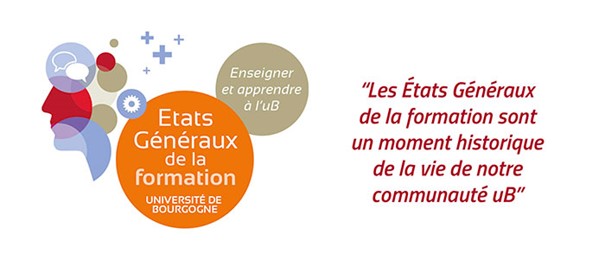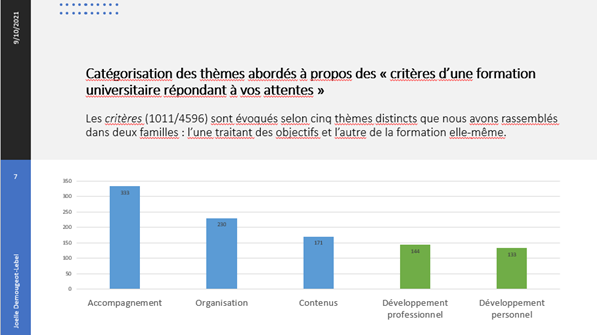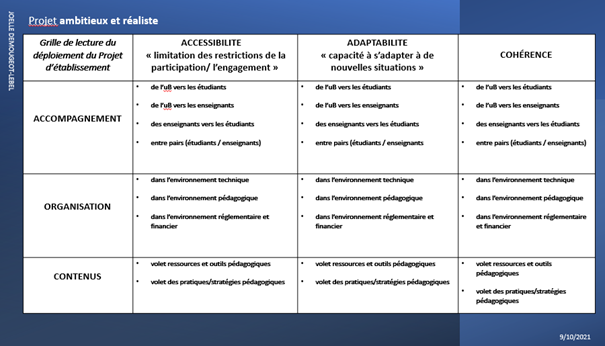Academics at the UBE
Academic programs at the UBE foster the personal and professional development of our learners.
To achieve our goals, the UBE has set up a number of special programs within its 400 courses and majors:
We are a University …
- Tutoring for first-year students,
- REO, the start-over semester
- TED
- Center for Solidarity in case of difficulties
- Loans of computers, 4G keys…
The UBE wants every student to have the necessary conditions to succeed in their university studies.
- Distance learning,
- Collaborative tools, pedagogical tools (Wooclap, Wooflash), accessible to all members of the university community
- Teaching platforms (Moodle, Plubel, Teams),
- Online documentation
- Modular workspaces…
The UBE has adapted its pedagogical tools and methods to meet the needs of its publics, bringing them in line with pedagogical know-how and adapting to meet current needs.
- Internships,
- Work-study programs,
- Job dating and job fairs throughout the year,
- Career center…
The UBE spares no effort to help students develop their skills. By alternating academic and practical teaching, the UBE prepares students for a smooth entry into the professional world.
The UBE supports students wishing to develop their entrepreneurial skills through a variety of programs:
- Modules dedicated to entrepreneurship
- Student self-entrepreneur status,
- Financial or material assistance to develop their projects (regional incubator for young talent, the “les Entrep‘’ Program) …
The UBE is a founding member of the FORTHEM European alliance of 9 European universities. In practical terms, this scheme enables students to take part in international mobility opportunities, summer courses or exchanges with the member European universities.
In addition to the FORTHEM alliance, our students can benefit from the ERASMUS program.
The Université Bourgogne Europe has developed over a hundred cooperative ventures with universities outside France, and welcomes numerous international students.
The Université Bourgogne Europe is also :
Ideal conditions for studying
Whether you’re working in a group, alone, in quiet conditions, in an individual space or not, the UBE boasts 11 specialized libraries, each with its own set of facilities. The UBE also has a number of “third places,” including the “Le Cortex” library, where users can relax, work or eat on site; and the Atheneum, the university’s cultural center, which is open all day.
Computer rooms are also freely available at the Maison de l’Étudiant (Student Center) and in the various campus buildings, as is extensive wi-fi coverage. For students with disabilities or health issues, there are also distance learning options such as the robot beam, to help them pursue their studies in the best possible conditions.
A favorable teaching environment
The UBE is committed on a daily basis to ensuring that teachers can find the answers to their questions about and aspirations for their teaching practices. With its teaching support services including the CIPE (Center for Pedagogical Innovation and Evaluation, Centre d’Innovation Pédagogique et d’Évaluation) and the PNR (Digital Pedagogy and Resources, Pédagogie Numérique et Ressources), the UBE provides its teachers with facilities to help them fulfill their teaching responsibilities:
- Leave to pursue Pedagogical Projects (CPP)
- Teaching residencies
- Year-round training and coaching by teaching support services
- Flexible teaching to encourage student commitment, motivation and perseverance
To ensure that the UBE Education Project continues to evolve in line with the changing needs of its users, 30 new actions have been planned, focusing on three key areas: studying, teaching and working at the UBE. The aim is to bring the Université Bourgogne Europe fully into the 21st century.
To find out more about the UBE Education Project :
Why this project ?
Force est de constater que la question de la formation à l’université est un sujet majeur tant il est traversé, Clearly the question of academics at the university is a major issue, as evinced by changes of all kinds that have been happening for several years now. This observation is based on the day-to-day reality of universities, which are undergoing major transformations linked to:
- users, their expectations, needs and behaviors
- societal expectations and regulatory frameworks, both national and supranational (European Higher Education Area)
- teaching practices, including evolving objectives, methods and tools
- recent transformations linked to the public health context
These changes in our university environment have prompted us to reflect on our education methods.
Has education changed, is it changing, must it change? We want to dive into this question, and to work together to draw up an institutional project on the subject, in order to reflect on and build the university education of tomorrow.
What is a University Education Project ?
The UBE is a multi-disciplinary institution with a healthcare component, serving almost 35,000 students. It is one of the components of the French higher education system, supported by a community as rich as it is diverse. The aim of this project is to define our vision of what education means to us.
The aim of this project is to establish our specific educative policy (intentions, objectives and organizational and operational methods) and to translate this policy into coherent strategic orientations and principles of action.
Our institution-wide project will be defined by the contributions all of us make, whatever our activities, responsibilities, functions or status within the university, because we all have “things to say” about academics at the UBE. The États Généraux (general assemblies) is the first step in this collective project, a step which will last a maximum of three years.
Official launch of the “États Généraux” (EG) on academics
President of Université Bourgogne Europe
Strategic advisor for pedagogy at DGESIP, teacher-researcher at Lyon 1 University.
Message from Sophie Morlaix and Karen Fiorentino
Deputy Vice-President in charge of bachelor’s and master’s degrees
Karen Fiorentino,
Vice-President of the CFVU
Message from Edith Salès-Wuillemin and Stéphane Tizio
Vice-President in charge of Quality of Life at Work
Stéphane Tizio,
Vice-President, Human Resources and Social Action
“États Généraux” (EG) on academics (drop-down menu)

The Université Bourgogne Europe continues to implement its University Education Project as part of a collective commitment.
Launched in December 2020 and running until February 2021, the first stage of the Etats Généraux enabled 1,221 members of our university community to express their views via an online survey.
Of these, 60% were students and 40% staff. Two thirds of all respondents did so anonymously. We were able to see that the main concerns of the university community in terms of academics revolve around:
- support within academic programs,
- the organization of academic programs,
- their content,
- as well as personal and professional opportunities for students.

At the end of April 2021, the second stage of the États Généraux brought together 42 students, teaching staff and support staff in small working groups to analyze and then highlight the key ideas arising from the responses previously collected.
Participants identified invariants and laid down principles for academics in our university. As a result, the University Project will be founded on the following statement of intent: “University education at the UBE seeks to further the personal and professional development of our students. This can be achieved through three axes: support, organization and content. Finally, each of these axes is regulated by 3 principles: accessibility, adaptability and coherence.”

Actuellement, le travail mené consiste à recenser l’existant concernant la formation et son environnement dans notre établissement pour alimenter ce découpage. Des propositions nouvelles seront par la suite présentées dans les mois à venir, afin de répondre aux aspirations de la communauté universitaire concernant la formation dans notre établissement.
Accédez au rapport « Enseigner et apprendre au XXIe : les perspectives de l’UBE »
30 proposals for academics (drop-down menu)
Since the end of 2020, the UBE has been reflecting on its academics. The Etats Généraux, which involved more than 1,000 members of the University, provided us with a scientific definition of our educative goal (“University education at the UBE seeks to further the personal and professional development of our students. This can be achieved through three axes: support, organization and content. Finally, each of these axes is regulated by 3 principles: accessibility, adaptability and coherence”)“) and 30 proposals to make our establishment an enabling environment for learning, teaching and working.
- Introduce orientation assistance for all newcomers via a student “welcome coordinator;”- Guarantee access to learning support (tutoring) during the first year of university study and extend the scheme to the second year;
- Encourage students’ autonomy and individualization of their study paths through specific programs;
- Popularize student-accessible schemes with links to the socio-economic world;
- Increase the visibility of pedagogical support tools and resources available to teachers (CPP, pedagogical residencies, support services training);
- Make teaching support centers more visible;
- Facilitate the access of Leave for Pedagogical Projects (CPP);
- Support and recognize teachers’ commitment to pedagogy;
- Facilitate the use of innovative pedagogical tools adapted to each course/department;
- Offer training in the use of UBE software, for both teachers and students;
- Extend the “decompartmentalization” experiment;
- Map Wi-Fi coverage on the UBE campuses in terms of surface area and quality;
- Extend W-iFi coverage on campuses (including the non-Dijon campuses) in terms of surface area and quality;
- Widely distribute academic framework documents;
- Guarantee the loan of digital equipment to students;
- Promote and encourage international experiences;
- Increase the number of electrical outlets to guarantee greater material autonomy on campus;
- Implement the renewal or acquisition of teaching equipment;
- Acquire common software licenses on a collective basis;
- Identify and increase the number of equipped open spaces and open-access rooms;
- Renew the “skills” experiment with a view to rolling it out to all bachelor’s and master’s courses;
- Optimize the use of ADE;
- Unify the specific features of distance learning/resource repository software (e.g., Plubel and Teams) and make them easier to understand;
- Strengthen students’ sense of belonging: set up an alumni system for each department (or, failing that, each UFR);
- Welcome new first year students and build their sense of belonging to the UBE;